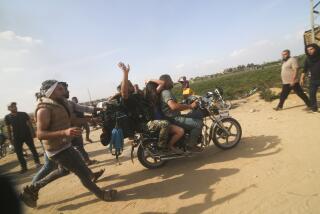Rights Groups Accuse Contras : Atrocities in Nicaragua Against Civilians Charged
- Share via
WASHINGTON — Mounting charges of atrocities against civilians by U.S.-backed Nicaraguan rebels took center stage Thursday in Congress’ debate on Central America, sparking angry charges from the Reagan Administration that human rights groups are acting on behalf of the leftist Sandinista regime.
Two private human rights organizations issued reports this week charging the contras , as the Nicaraguan rebels are commonly called, with a pattern of attacks on civilians, including murder, torture and rape. Democrats in Congress said they will use the charges to fight the Administration’s request for renewed U.S. aid for the rebels .
The most detailed report, issued Thursday by the International Human Rights Law Group, was based on 145 sworn statements from Nicaraguans who said they had witnessed 28 incidents of misconduct by the contras. “The documentation shows a pattern of brutality against largely unarmed civilians, including rape, torture, kidnapings, mutilation and other abuses,” the group said.
Earlier, Americas Watch, another private human rights group, said that both the contras and the Sandinistas have violated the laws of war in their conflict but added that the government has reduced its abuses while reports of contra violence against civilians continue to accumulate.
President Reagan has lauded the rebels as “moral equals of our Founding Fathers,” and Secretary of State George P. Shultz reacted sharply to questions from a Senate panel on the atrocity reports, charging that they were politically inspired.
Affidavits and Photos
At a hearing of the Senate Appropriations subcommittee on foreign operations, Sen. Patrick J. Leahy (D-Vt.), told Shultz: “There is a growing body of evidence that the contras have committed widespread violence against the civilian population. I am concerned that money from our government goes to an organization that commits atrocities. I have been given affidavits by victims of atrocities, terrible photographs.”
Shultz replied: “I do not say that there aren’t some problems.” But, observing that critics regularly raise such controversies when Congress is preparing to vote on significant issues, he added: “The Sandinista government has almost an unblemished record of trying to mislead us about what is going on.”
Other State Department officials, speaking on condition that they not be identified, attacked the human rights groups’ reports as “disinformation.” But they offered no specific evidence to support the charge.
A spokesman for the largest contra group, the Nicaraguan Democratic Force (FDN), dismissed the reports as “comic books.” But the spokesman, Bosco Matamoros, said he was unable to rebut any of their specific charges. “We are a guerrilla army,” he said, “and we haven’t been very rigorous about keeping records.”
‘No Disciplinary System’
However, a former Nicaraguan Democratic Force official, Edgar Chamorro, said he considers the charges credible. “Our commanders often admitted these charges to me,” said Chamorro, who was expelled from the FDN last year for publicizing some of the reports. “It’s not a deliberate policy, but there are abuses . . . and there is no disciplinary system.”
A State Department spokesman said there has been no official U.S. investigation of the allegations of rebel misconduct, some of which were made as long as three years ago.
“No one from our embassy in Managua goes out and conducts an investigation on our own behalf,” the spokesman, Gilbert Callaway, said. “That’s not the sort of thing we routinely do.”
The International Human Rights Law Group report described more than 16 alleged contra attacks on civilians on farms and villages, five ambushes of civilian vehicles on rural roads, 11 kidnapings and seven rapes.
Children Slain
Typical among them was an Oct. 28, 1982, contra attack on the rural area of El Jicaro in northern Nicaragua. In an affidavit, Maria Bustillo, 57, testified that five armed men dressed in the FDN’s blue uniforms burst into her house and dragged away her husband Ricardo, a Roman Catholic activist, and five of their children. The next morning she found the mutilated bodies of the children. Her husband’s body was found later.
The report was written by Reed Brody, a former assistant attorney general in New York state. Brody acknowledged that he had been recruited to write the report by a Washington lawyer who represents the Sandinista government and that he received help from the Managua regime during his three months in the country but insisted that his investigation was not swayed by those circumstances.
Asked whether the Nicaraguan peasants he interviewed might have feared government reprisal if they made statements critical of the regime, he said: “They might have feared reprisals from the FDN, too.”
More to Read
Sign up for Essential California
The most important California stories and recommendations in your inbox every morning.
You may occasionally receive promotional content from the Los Angeles Times.














